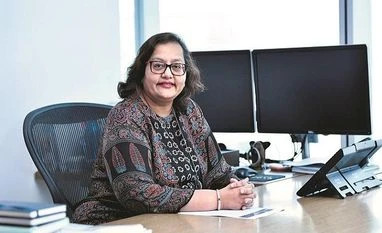“I can’t say how the deal pipeline would have looked if the pandemic had not broken out last year. All that I can say is that there has been a flurry of deals and our pipeline is robust,” says Asit Bhatia, managing director for global corporate and investment banking (i-banking) at Bank of America (BankAm).
He points to the $2.7 billion monetisation for Standard Life Aberdeen through 2019 and 2020 (across seven deals): A first-of-its-kind on a sole basis on the local bourses. The last one in March 2020 was the lung-opener in deal-making after the lockdown. Then there was Facebook Inc’s in-bound $5.7 billion deal for a 9.99 per cent minority stake in Jio Platforms. These proved it was to be business-as-usual for i-banking high-rollers.
BankAm topped Dealogic’s league tables for equities at $2.8 billion in deals (followed by ICICI Securities at $2.4 billion and JP Morgan, or JPM, at $2.4 billion) for FY21. On the mergers and acquisitions (M&A) side, Morgan Stanley is in pole position with $38.1 billion, BankAm comes next at $21.2 billion, with JPM at $8.3 billion. BankAm fell away on the M&A league table as it was on Facebook’s side for Reliance Jio; and it couldn’t have supped on a few deals for the Reliance group.
League tables can mislead as well. Many i-banks sit around to carve out a deal, and all lay claim credit to it. It’s a specific i-bank’s place in the sectors it has expertise in, and the share of deals which matters. A better indicator is the long-term trendline: BankAm has raised over $60 billion and done over $100 billion in M&A over the past decade.
In the spotlight
The i-banking world is changing, with startups and old conglomerates incubating within their fold. “We have to be nimble and ideate faster when dealing with startups, because they are burning capital and at the same time, looking to monetise stakes. Many of today’s big or large-cap firms were nascent or new businesses a decade or two ago,” says Kaku Nakhate, president and India country head of BankAm. “Our learnings while working with these businesses have helped us in our approach to bank startups. That is where our i-banking strength comes from.”
To better appreciate her point of view, we need to step back in time. BankAm has been in India since 1964 (more or less of the same vintage as Deutsche Bank), but is a teenager when compared to a Standard Chartered Bank, or a HSBC, which have been around since the 1850s. But post-reforms, BankAm has been a trail-blazer in corporate and i-banking, which had opened up.
In the 1990s, it was involved in HDFC Bank’s maiden float (1995); the first American Depositary Receipts issuance out of India (Infosys in 1999); and the first 100 per cent book-built issue (Bharti Televentures in 2002). The first ever cross-border loan syndication in telephony (for Birla-AT&T in 1996) was jointly run by BankAm and Toronto Dominion Bank, the deal-size being $125 million. And this at a time when the issue of assignment of telecom licences as collateral had not been fully settled.
The force-multiplier was the acquisition of Merrill Lynch (ML) in September 2008. It gave a leg-up to the global platform, but also brought in a true-blue local i-banking team — DSP-ML. “The seamless integration of ML’s India business with our franchise enabled us to serve our clients better,” says Nakhate. No other multinational bank answers to such a profile.
It has also meant the India franchise is not a Roman outpost. Thomas K Montag (its chief operating officer, and president-global banking and markets); and Matthew Koder, president-global corporate and i-banking, are regular travellers to India. And Montag nudged BankAm to open an i-banking office in Bengaluru.
For the morrow
Reducing the carbon footprint will mark deals in i-banking, more so after US President Joe Biden's administration said it was a key agenda item. “Green bonds or green M&A transactions are on the rise (in India). We have been very active (in this space), with the transactions of ReNew Power, Greenko and Softbank Energy. The recent announcements by RIL reiterates the focus that India Inc has on green themes,” notes Raj Balakrishnan, head of India i-banking at BankAm.
A landmark deal was RMG Acquisition Corporation II’s move to merge with ReNew for an enterprise value of approximately $8 billion. This was the first de-SPAC transaction involving an India-based target, and the first-ever de-SPAC of a utility-scale renewable power, globally. De-SPACs are firms that go public after a merger with a special purpose acquisition company (SPAC); and the “de” refers to the end of the SPAC, which then morphs into a public company. Globally, high-profile de-SPACs include Virgin Galactic, DraftKings, QuantumScape, and Opendoor Technologies. The good times are expected to continue.
“While interest rates in the US may start rising from a very low base, we should remember that this is being driven by robust growth expectations. The situation is not one where rates are rising due to inflationary pressures amidst low growth as seen in the past,” says Balakrishnan.
His partner-in-arms Bhatia (described by a colleague as “our quarterback”, using a term from American football), adds: “Even in the pandemic, it’s not that we need more i-banks to execute deals. The fee-pool has largely remained intact.”
BankAm’s i-banking’s internal tagline is, “One team, one dream”. This could well be read as: Dream team!
Unlock 30+ premium stories daily hand-picked by our editors, across devices on browser and app.
Pick your 5 favourite companies, get a daily email with all news updates on them.
Full access to our intuitive epaper - clip, save, share articles from any device; newspaper archives from 2006.
Preferential invites to Business Standard events.
Curated newsletters on markets, personal finance, policy & politics, start-ups, technology, and more.
)